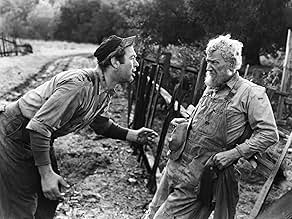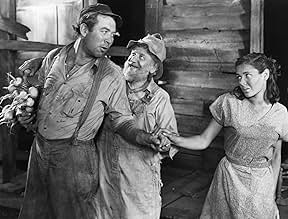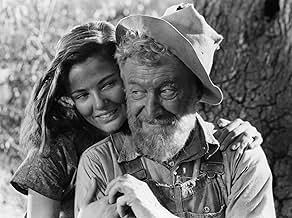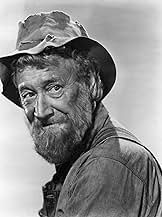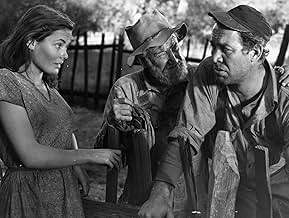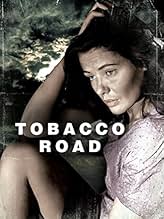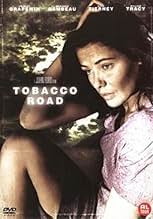CALIFICACIÓN DE IMDb
6.4/10
2.7 k
TU CALIFICACIÓN
Agrega una trama en tu idiomaHillbilly family farm life in 1941 rural Georgia.Hillbilly family farm life in 1941 rural Georgia.Hillbilly family farm life in 1941 rural Georgia.
- Dirección
- Guionistas
- Elenco
- Premios
- 2 premios ganados en total
Dorothy Adams
- Payne's Secretary
- (sin créditos)
Erville Alderson
- Driver of Car Almost Hit by Dude Lester
- (sin créditos)
- Dirección
- Guionistas
- Todo el elenco y el equipo
- Producción, taquilla y más en IMDbPro
Opiniones destacadas
Dirt poor, elderly Georgia farmer Jeeter Lester (Charley Grapewin) schemes to get some money so that he and his wife Ada (Elizabeth Patterson) can remain at their dilapidated frame house on Tobacco Road, in this Great Depression era story, part comedy, part drama.
As country hicks, most of the characters are rather too stereotyped to be realistic. The film's script is very talky, not surprising since the story originated as a stage play. The film's plot varies wildly from slapstick comedy to morose drama. And therein lies the main problem.
Rural poverty in the South during the 1930s was no laughing matter. It was an intensely painful and prolonged episode of human misery. I can understand how viewers in those days needed some comic relief, but not in a story about poverty. The hyper-antics of young Dude, the film's comic relief, are extremely annoying. Those scenes dilute the seriousness of the film's underlying theme. And the subplot wherein Dude and Sister Bessie go off together seems like plot filler.
Charley Grapewin gives a fine performance in the lead role. But Marjorie Rambeau as Sister Bessie, and William Tracy as Dude overact. Part of this overacting could have been the result of poor film direction.
The film's background music runs the gamut from frivolous and nondescript in the comedic scenes to old-time gospel songs like "Shall We Gather At The River" during more serious moments.
Given the era in which the film was made, "Tobacco Road" is okay, if you give it some slack. But the story would have been better without the slapstick comedy. In any event, it's a good movie to watch when you're depressed and think things can't get much worse.
As country hicks, most of the characters are rather too stereotyped to be realistic. The film's script is very talky, not surprising since the story originated as a stage play. The film's plot varies wildly from slapstick comedy to morose drama. And therein lies the main problem.
Rural poverty in the South during the 1930s was no laughing matter. It was an intensely painful and prolonged episode of human misery. I can understand how viewers in those days needed some comic relief, but not in a story about poverty. The hyper-antics of young Dude, the film's comic relief, are extremely annoying. Those scenes dilute the seriousness of the film's underlying theme. And the subplot wherein Dude and Sister Bessie go off together seems like plot filler.
Charley Grapewin gives a fine performance in the lead role. But Marjorie Rambeau as Sister Bessie, and William Tracy as Dude overact. Part of this overacting could have been the result of poor film direction.
The film's background music runs the gamut from frivolous and nondescript in the comedic scenes to old-time gospel songs like "Shall We Gather At The River" during more serious moments.
Given the era in which the film was made, "Tobacco Road" is okay, if you give it some slack. But the story would have been better without the slapstick comedy. In any event, it's a good movie to watch when you're depressed and think things can't get much worse.
John Ford directed this adaptation of a hit play about a family of dirt poor toothless Southern farmers. Charley Grapewin is great and carries the film on his shoulders. Elizabeth Patterson gives an enjoyable (and sometimes sensitive) turn as his wife. William Tracy plays a savage character who grates on the nerves but he does a good job at it. Ward Bond is funny as a neighbor married to one of their daughters. He has the movie's most crowd-pleasing scene when he puts Tracy in his place. Dana Andrews and Gene Tierney have small roles. I think Tierney spoke less than twenty words the whole film.
Any comparison between this film and Ford's classic from the year before, Grapes of Wrath, is absurd. Beyond the very superficial similarities, they are nothing alike. This doesn't have the gravitas or artistry of that film. The closest it comes is the scene when Grapewin and Patterson talk about two of their children who left home and never returned. The rest is a grotesque comedy about people that are almost cartoon characters more than humans.
Obviously not for the easily offended among us. This film peddles in just about every Southern stereotype you can think of. Having grown up in the South with relatives not too far removed from the types of characters displayed in this, I'm not really bothered by it. Stereotypes generally have some basis in truth, no matter how much we don't want to admit it. Amusing at times, moving once or twice, but not the masterpiece it wants to be. See it for Grapewin's energetic performance if nothing else.
Any comparison between this film and Ford's classic from the year before, Grapes of Wrath, is absurd. Beyond the very superficial similarities, they are nothing alike. This doesn't have the gravitas or artistry of that film. The closest it comes is the scene when Grapewin and Patterson talk about two of their children who left home and never returned. The rest is a grotesque comedy about people that are almost cartoon characters more than humans.
Obviously not for the easily offended among us. This film peddles in just about every Southern stereotype you can think of. Having grown up in the South with relatives not too far removed from the types of characters displayed in this, I'm not really bothered by it. Stereotypes generally have some basis in truth, no matter how much we don't want to admit it. Amusing at times, moving once or twice, but not the masterpiece it wants to be. See it for Grapewin's energetic performance if nothing else.
It's hard to even understand why TOBACCO ROAD was such a long-running success on the Broadway stage. Fox has taken the play, cut all of the more sizzling elements that made it intriguing, and reduced it to a tale of dirt poor farm folk too shiftless to make a living off the land with the accent on comedy rather than focusing on a few of the more poignant moments.
It's certainly a disappointment to find Dana Andrews and Gene Tierney totally wasted in small roles early in their careers at Fox. Tierney, especially, has little to do but say a few lines and look as unscrubbed as possible. It's really an embarrassment to watch her in this role.
Overacting is in abundance, particularly from William Tracy as the imbecilic son, Dude, who is crazy from start to finish (with Ward Bond delivering him a well-deserved punch at the finale). Marjorie Rambeau as a gospel-singing fanatic overacts too and even Ward Bond is irritating at times.
But in the central role of the shiftless farmer who spends the whole story trying to devise ways to save his land with a $100 down payment, Charlie Grapewin gives a fine, nuanced performance, slipping easily from comedy to drama without a strain. Elizabeth Patterson tries to give some dignity to the role of his equally downtrodden wife.
John Ford's uninspired direction is largely responsible for the lackluster overall impact of the film, based on the play taken from an earthy Erskine Caldwell novel. Whatever elements made the play so enormously successful have been eliminated in Nunnally Johnson's screenplay.
Summing up: A huge disappointment on many levels although it contains some striking B&W photography.
It's certainly a disappointment to find Dana Andrews and Gene Tierney totally wasted in small roles early in their careers at Fox. Tierney, especially, has little to do but say a few lines and look as unscrubbed as possible. It's really an embarrassment to watch her in this role.
Overacting is in abundance, particularly from William Tracy as the imbecilic son, Dude, who is crazy from start to finish (with Ward Bond delivering him a well-deserved punch at the finale). Marjorie Rambeau as a gospel-singing fanatic overacts too and even Ward Bond is irritating at times.
But in the central role of the shiftless farmer who spends the whole story trying to devise ways to save his land with a $100 down payment, Charlie Grapewin gives a fine, nuanced performance, slipping easily from comedy to drama without a strain. Elizabeth Patterson tries to give some dignity to the role of his equally downtrodden wife.
John Ford's uninspired direction is largely responsible for the lackluster overall impact of the film, based on the play taken from an earthy Erskine Caldwell novel. Whatever elements made the play so enormously successful have been eliminated in Nunnally Johnson's screenplay.
Summing up: A huge disappointment on many levels although it contains some striking B&W photography.
Tobacco Road (1941)
** 1/2 (out of 4)
I take pride in watching bizarre movies from every country and every decade but I never figured that's what I'd be viewing when I sat down to watch this John Ford film that seems to have been forgotten over the years. The movie, based on the famous novel and long-running play, centers on Jeeter Lester (Charley Grapewin) and his family, poor Georgia farmers who are about to get kicked off their land unless they can round up $100 to stay for a year. That's pretty much all there is to know story wise, although the screenplay does take the film into different directions as the family is faced with the possibility of losing everything they love. If people got wide-eyed about the way Ford showed Indians then they're probably going to have their heads rolling off at this look at a redneck family. I was really, really caught off guard by how incredibly bizarre and strange this movie was. I think part of this is due to the comedy never working and for some strange reason this gives the film a rather bizarre atmosphere because you're watching this strange stuff yet nothing really laughing. The humor is rather strange because there's an older man (ward Bond) not wanting to marry an "old woman" of 23-years because he likes his 13-year-old current wife. We have humor about one of the Lester sons (William Tracy) who is so crazy and out of control that you can't help but think he's retarded and the film tries to get laughs off of this. We have the young Lester daughter (Gene Tierney) lusting after the older man with a lot of sexual innuendo. This redneck family is just so weird that you can't help but be slightly put off by them and the fact that the film is trying for laughs just makes some of it even stranger. The one major saving grace is the performance by Grapewin who really is marvelous here. His old-time redneck is spot on with the dialogue delivery and body movements that there's no doubt the character will ever leave your mind once you've seen it. Supporting players like Elizabeth Patterson and Dana Andrews come off pretty well but the same can't be said for Tierney who really looks bad here. She just isn't right for the role and she comes off looking like she's really struggling to do something with it. Ford's direction isn't all that bad but there's a reason this film isn't really that well-known or talked about when people discuss his work.
** 1/2 (out of 4)
I take pride in watching bizarre movies from every country and every decade but I never figured that's what I'd be viewing when I sat down to watch this John Ford film that seems to have been forgotten over the years. The movie, based on the famous novel and long-running play, centers on Jeeter Lester (Charley Grapewin) and his family, poor Georgia farmers who are about to get kicked off their land unless they can round up $100 to stay for a year. That's pretty much all there is to know story wise, although the screenplay does take the film into different directions as the family is faced with the possibility of losing everything they love. If people got wide-eyed about the way Ford showed Indians then they're probably going to have their heads rolling off at this look at a redneck family. I was really, really caught off guard by how incredibly bizarre and strange this movie was. I think part of this is due to the comedy never working and for some strange reason this gives the film a rather bizarre atmosphere because you're watching this strange stuff yet nothing really laughing. The humor is rather strange because there's an older man (ward Bond) not wanting to marry an "old woman" of 23-years because he likes his 13-year-old current wife. We have humor about one of the Lester sons (William Tracy) who is so crazy and out of control that you can't help but think he's retarded and the film tries to get laughs off of this. We have the young Lester daughter (Gene Tierney) lusting after the older man with a lot of sexual innuendo. This redneck family is just so weird that you can't help but be slightly put off by them and the fact that the film is trying for laughs just makes some of it even stranger. The one major saving grace is the performance by Grapewin who really is marvelous here. His old-time redneck is spot on with the dialogue delivery and body movements that there's no doubt the character will ever leave your mind once you've seen it. Supporting players like Elizabeth Patterson and Dana Andrews come off pretty well but the same can't be said for Tierney who really looks bad here. She just isn't right for the role and she comes off looking like she's really struggling to do something with it. Ford's direction isn't all that bad but there's a reason this film isn't really that well-known or talked about when people discuss his work.
Tobacco Road as was written by Erskine Caldwell and dramatized on Broadway for 8 years was brought to the screen by 20th Century Fox in a considerably altered state. It was thought of probably by Darryl Zanuck as a great property for John Ford seeing what he did with The Grapes Of Wrath.
The Grapes Of Wrath by John Steinbeck is a great piece of social commentary, an immortal work whether in print or on the big or small screen. Ford kept the spirit of Steinbeck's work completely intact and got a well deserved Best Director Oscar. In this one because Caldwell's Jeeters are not quite as noble as the Joads of The Grapes Of Wrath, they're not prototype rural proletarians. The changes took a lot of the drama and commentary and left the film not too far above the Weaver Family films and Ma and Pa Kettle.
Charley Grapewin and Bessie Patterson are Mr.&Mrs. Jeeter Lester and Jeeter is a guy determined to get by doing as little as possible. The whole family has his spirit. He's married most of his children off. One of the daughters in serious trouble of being an old maid at 23 and that was Gene Tierney if you can believe that. Her character in the book and play has a cleft palate and you can understand why she's not married off. Here she's just gorgeous Gene Tierney and a crucial element is missing.
There's another daughter Pearl whom we never see, but who's married to the loutish Ward Bond. She keeps running off and Bond just doesn't get it. Here he's just rustic lout, I suspect that the 13 year old Pearl figures she can do a whole lot better. That one I'm sure the Code was breathing hot and heavy over 20th Century Fox.
There's another physically deformed character and that's Marjorie Rambeau who has in the book a nose like a pig's snout. Grapewin palms off his 16 year old son as a new husband for Rambeau to get his hands on the insurance money her old husband left her. William Tracy as the kid who's no prize figures she's experienced and eager even if she's a psalm singer which she is.
The rough house comedy that typifies many a Ford film is funny, but hardly in the spirit of what Caldwell was writing. In the end I have to say that the film is not good John Ford, though he's done worse.
The Grapes Of Wrath by John Steinbeck is a great piece of social commentary, an immortal work whether in print or on the big or small screen. Ford kept the spirit of Steinbeck's work completely intact and got a well deserved Best Director Oscar. In this one because Caldwell's Jeeters are not quite as noble as the Joads of The Grapes Of Wrath, they're not prototype rural proletarians. The changes took a lot of the drama and commentary and left the film not too far above the Weaver Family films and Ma and Pa Kettle.
Charley Grapewin and Bessie Patterson are Mr.&Mrs. Jeeter Lester and Jeeter is a guy determined to get by doing as little as possible. The whole family has his spirit. He's married most of his children off. One of the daughters in serious trouble of being an old maid at 23 and that was Gene Tierney if you can believe that. Her character in the book and play has a cleft palate and you can understand why she's not married off. Here she's just gorgeous Gene Tierney and a crucial element is missing.
There's another daughter Pearl whom we never see, but who's married to the loutish Ward Bond. She keeps running off and Bond just doesn't get it. Here he's just rustic lout, I suspect that the 13 year old Pearl figures she can do a whole lot better. That one I'm sure the Code was breathing hot and heavy over 20th Century Fox.
There's another physically deformed character and that's Marjorie Rambeau who has in the book a nose like a pig's snout. Grapewin palms off his 16 year old son as a new husband for Rambeau to get his hands on the insurance money her old husband left her. William Tracy as the kid who's no prize figures she's experienced and eager even if she's a psalm singer which she is.
The rough house comedy that typifies many a Ford film is funny, but hardly in the spirit of what Caldwell was writing. In the end I have to say that the film is not good John Ford, though he's done worse.
¿Sabías que…?
- TriviaGene Tierney and Dana Andrews get barely five minutes of screen time each, with Tierney getting just half a dozen lines to speak.
- ErroresWhen the new car is tipped over, after being driven on dirt roads and through mud, the underside is spotless.
- Créditos curiososOpening and some of the closing credits are presented written in real sand.
- ConexionesReferenced in La gloria de todos (1942)
- Bandas sonorasDixie's Land
(uncredited)
Written by Daniel Decatur Emmett
[Variations often played as background music]
Selecciones populares
Inicia sesión para calificar y agrega a la lista de videos para obtener recomendaciones personalizadas
- How long is Tobacco Road?Con tecnología de Alexa
Detalles
Taquilla
- Total a nivel mundial
- USD 534
- Tiempo de ejecución
- 1h 24min(84 min)
- Color
- Relación de aspecto
- 1.37 : 1
Contribuir a esta página
Sugiere una edición o agrega el contenido que falta

